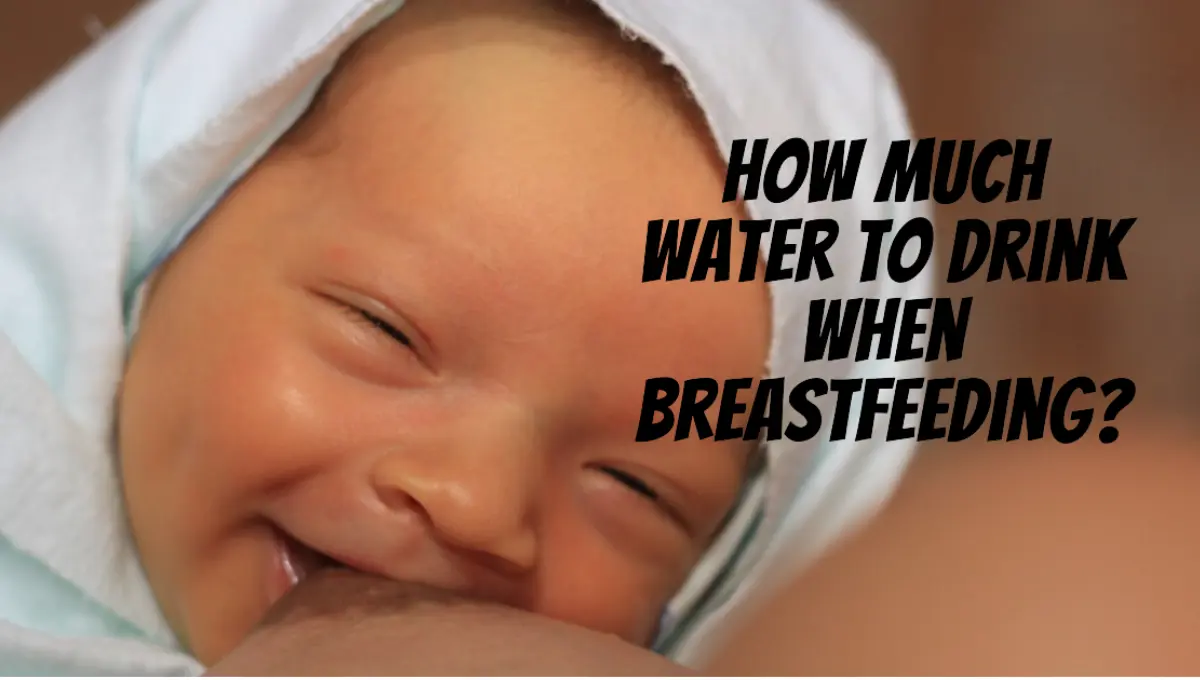
Breastfeeding is a beautiful journey that provides essential nutrients to the newborn. However, it also demands a lot from the mother’s body, especially in terms of hydration. With the body working overtime to produce milk, it’s crucial for mothers to understand how much water to drink when breastfeeding and the importance of staying hydrated.
Did you know? Breast milk is approximately 90% water. This fact alone underscores the significance of water intake during this phase.
Key Takeaways:
- Breast milk is about 90% water.
- Experts recommend drinking about 10-12 cups (80-96 ounces) of water per day if you are breastfeeding.
- The color of your urine can be an indicator of your hydration level.
- All liquids, including water-rich foods, contribute to your overall fluid intake.
- Overhydration can negatively impact milk supply.
How Much Water To Drink When Breastfeeding?
When breastfeeding, a mother’s hydration needs increase because breast milk consists of about 90% water. It’s essential for breastfeeding mothers to stay well-hydrated to support milk production and maintain their own health. Here are some general guidelines regarding water intake during breastfeeding:
- Listen to Your Body: The most straightforward advice is to drink when you’re thirsty. Your body will often signal you to drink more by making you feel thirsty, especially after or during nursing.
- General Recommendation: While the general recommendation for adults is about 8-10 cups (64-80 ounces) of water a day, breastfeeding mothers may need to drink a bit more, around 10-12 cups (80-96 ounces) or even more, depending on various factors.
- Factors Affecting Water Needs:
- Frequency of Breastfeeding: If you’re exclusively breastfeeding and your baby nurses frequently, you’ll need more fluids.
- Physical Activity: If you’re active and sweat more, you’ll need to drink extra water to compensate for the loss.
- Climate: Living in a hot or dry climate can increase your fluid needs.
- Diet: If your diet includes a lot of water-rich foods like fruits and vegetables, you might not need to drink as much water.
- Other Fluids Count: It’s not just water that counts towards your fluid intake. Milk, juice, tea, and soups also contribute to your hydration. However, it’s essential to be mindful of the calorie and sugar content in some beverages.
- Limit Caffeine: While having a cup of coffee or tea is generally considered safe when breastfeeding, it’s a good idea to limit your caffeine intake. Excessive caffeine can lead to dehydration and might affect the baby if passed through breast milk.
- Monitor Your Urine: A good indicator of hydration is the color of your urine. If it’s light and clear, you’re likely well-hydrated. If it’s dark, you might need to drink more fluids.
- Stay Consistent: Try to make it a habit to drink a glass of water every time you sit down to breastfeed. Keeping a water bottle handy can also remind you to drink regularly.
How Drinking Water Affects Milk Supply?

While it might seem logical that increasing water intake would boost milk supply, research suggests otherwise. Drinking more than your usual amount of fluids does not necessarily increase milk supply. The key is to drink enough to stay adequately hydrated. On the other hand, dehydration can negatively impact both your health and breast milk quality.
How to Avoid Dehydration?
Rather than focusing on a specific number of ounces, the goal is to prevent dehydration. Symptoms of dehydration include:
- Constipation
- Dizziness
- Dry mouth and chapped lips
- Fatigue
- Headache
- Mood swings
- Muscle cramps
- Nausea
How to Get Enough Fluids?
Listen to your body. Thirst is a natural indicator that you need to drink more. By the time you feel thirsty, your body might already be low on fluids. The hormone oxytocin, released during breastfeeding, naturally affects your thirst cues, ensuring you drink enough to produce breast milk.
A simple way to check your hydration level is by observing the color of your urine. A pale yellow or almost clear color indicates proper hydration, while a darker shade suggests dehydration.
Do All Liquids Count Towards Hydration?
While water is an excellent choice for hydration, other liquids and water-rich foods also contribute. This includes milk, decaffeinated coffee or tea, fruit or vegetable juice, and foods like oranges, watermelon, berries, soup, cucumbers, tomatoes, and lettuce.
Which Drinks to Limit When Breastfeeding?
While nursing, it’s essential to be mindful of the beverages you consume. Some drinks to limit or avoid include:
- Sugary Sodas and Fruit Drinks: High sugar content can reduce fluid retention in the body.
- Caffeinated Drinks: Caffeine can pass into breast milk and affect the baby. It’s also a diuretic, leading to fluid loss.
- Alcohol: It’s a myth that alcohol boosts milk supply. In reality, it can inhibit the letdown reflex.
Frequently Asked Questions (FAQs)
How much water should I drink while breastfeeding?
Experts recommend about 80-96 ounces (or 10-12 cups) per day. However, individual needs may vary.
Can drinking more water increase my milk supply?
Research suggests that merely increasing fluid intake does not boost milk supply. The key is to stay adequately hydrated.
Are there any drinks I should avoid while breastfeeding?
It’s best to limit sugary sodas, caffeinated drinks, and alcohol while nursing.
Conclusion
Remember, every individual is different. While the general guideline is to consume about 80-96 ounces of water daily when breastfeeding, your needs might differ based on various factors like weather, activity level, and individual body requirements. Always consult with a healthcare provider or lactation consultant if you have concerns about your hydration needs during breastfeeding.











